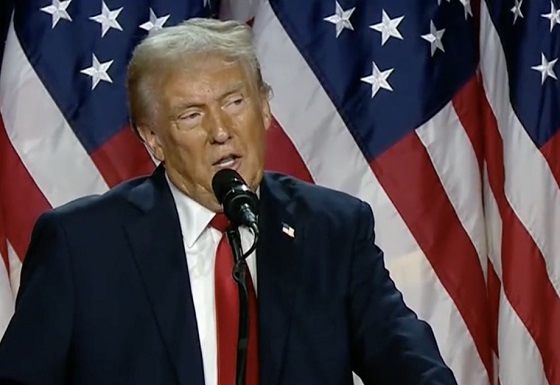From The Center Square
Results in the seven battlegrounds – Pennsylvania, Michigan, Georgia, North Carolina, Wisconsin, Arizona and Nevada – were expected to determine the outcome of the presidential race between Republican nominee Trump and Vice President Kamala Harris, the Democratic nominee. Trump has won at least three and leads in the other four.
Former President Donald Trump declared victory early Wednesday as he closed in on the 270 Electoral College votes needed to security the presidency.
Trump would be the 47th U.S. president after serving as its 45th.
As votes were counted, it was clear Trump had the momentum as each state reported results. In a stunning comeback, the former president will win after surviving two assassination attempts and as he faces four separate criminal prosecutions that were launched after he left the White House in 2021.
Trump won in the key swing states of North Carolina, Georgia and Pennsylvania and surged to leads in the other key swing states.
With North Carolina’s 16 electoral votes, Georgia’s 16 and Pennsylvania’s 19, Trump is at 267, just three shy of securing the White House. Fox News called Wisconsin and its 10 electoral votes shortly after 1:30 a.m. Monday, but other major outlets have not yet followed suit.
If Wisconsin’s do go to Trump, that would put him at 277, enough to win the race. Alaska and its three electoral votes, where Trump had a 14 percentage point lead with 51% of votes reporting as of 2:15 a.m. Eastern, also would be added.
Trump also leads the national popular vote, 51.2% to 47.4%. In 2016, when Trump won the White House over Hillary Clinton, and in 2020, when he lost his reelection bid to President Joe Biden, Trump lost the national popular vote.
Results in the seven battlegrounds – Pennsylvania, Michigan, Georgia, North Carolina, Wisconsin, Arizona and Nevada – were expected to determine the outcome of the presidential race between Republican nominee Trump and Vice President Kamala Harris, the Democratic nominee. Trump has won at least three and leads in the other four.
After North Carolina, Georgia and Pennsylvania fell in Trump’s favor, as of 2:30 a.m. Eastern, the former president holds leads over Harris in Wisconsin, 51.3%-47.3%, with 90% of votes counted; in Michigan, 52.5% to 45.8% with 73% of returns reported; in Arizona, 50.3% to 48.9% with 52% of votes counted; and in Nevada, 51.6% to 46.7% with 80% in.
National media outlets are projecting Trump has already secured 248 electoral votes of the 270 needed to win the election. Trump won in Idaho, Iowa, Ohio, Texas, Missouri, North Dakota, South Dakota, Utah, Montana, Nebraska, Kansas, Louisiana, Wyoming, Arkansas, Indiana, West Virginia, South Carolina, Tennessee, Mississippi, Alabama, Florida, Oklahoma and Kentucky.
Harris has secured 216 electoral votes by winning in California, Washington, Oregon, New Mexico, Hawaii, Maine, Colorado, New York, New Jersey, New Hampshire, Connecticut, Massachusetts, Illinois, Vermont, Maryland, Delaware and Rhode Island.
Cedric Richmond, co-chairman of the Harris campaign, addressed supporters early Wednesday, saying there were still plenty of votes to be counted. He also said Harris would not be making a statement until later Wednesday.
None of the called races are surprises.
As The Center Square reported Monday, Trump and Harris were virtually tied nationally going in to Election Day, according to Real Clear Politics’ polling average. More than 150 million Americans are expected to cast ballots this election.
Among the swing states that will decide the outcome, RCP had Trump leading Arizona by 2.5 points, Georgia by 1.9 points, Nevada by 1 point, North Carolina by 1.5 points, and Pennsylvania by 0.3 points.
In the same averaging of recent polls, Harris led Michigan by 1.2 points and Wisconsin by 0.4 points.
It remains to be seen if voters will know a winner by Wednesday morning.











